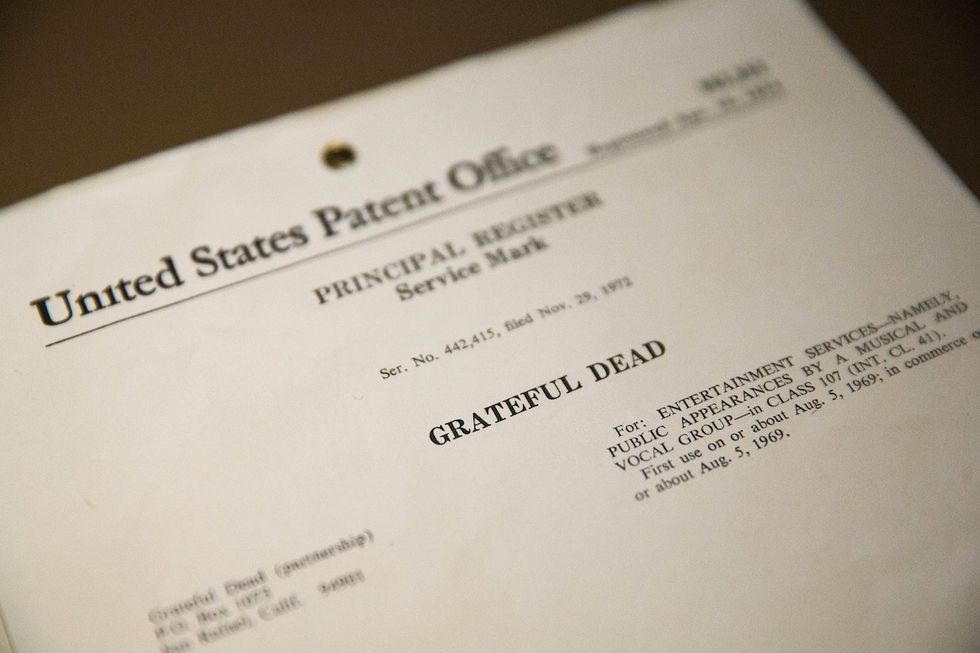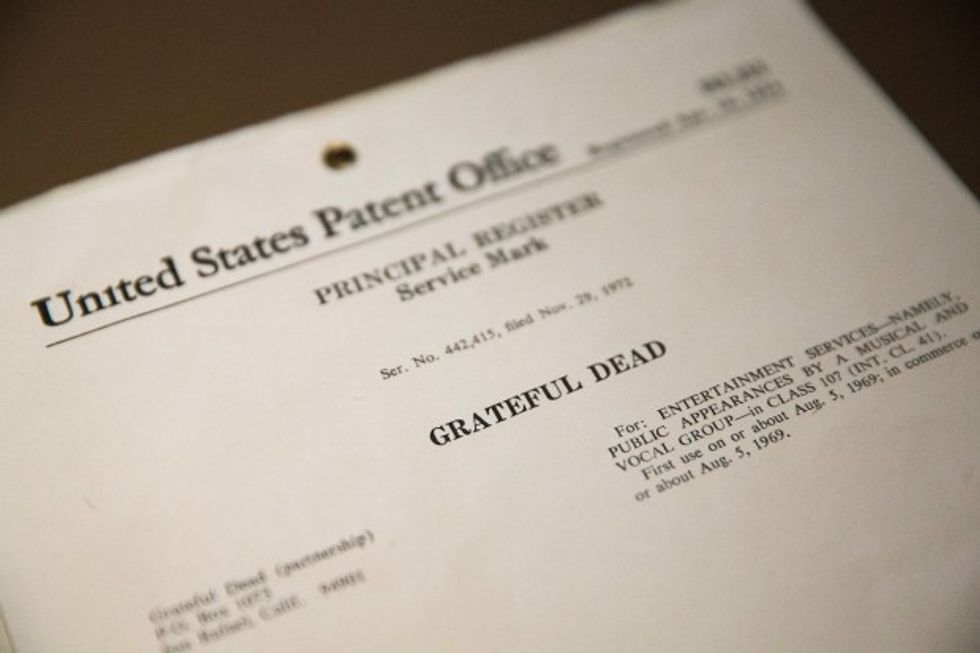
The original U.S. Patent & Copyright embossed document registering ownership of the name 'Grateful Dead' is prepared for auction on March 27, 2015 in Union, Illinois. (Photo: Scott Olson/Getty Images)

Over the past several years, Congress has attempted to deal with a drain on our economy known as the patent troll.
The term patent troll means a person or company trying to enforce patent rights against another person or company far beyond the actual value of the patent or far beyond the contribution that the patent enforcer contributed to the work.

In other words, it is a person who didn’t do much to contribute to a patented creation, yet is trying to make more money off the patent than they deserve. Patent trolls, backed by greedy and enterprising trial lawyers, typically accuse businesses of patent infringement and demand payment far beyond the value of the patent. These trolls prey on businesses large and small, ultimately raising costs for consumers like you and me.
As patent legislation that attempts to limit the ability of these lawyers to bury businesses in litigation stalls in the Congress, another Federal department is considering whether or not to give rise to another, yet equally market-manipulating force – the “copyright troll.”
The copyright troll is the same concept applied to the creation of music. If the Department of Justice allows something called “frational licensing,” they will be opening the door to small participants in the creation of music to use the power of the whole licensing process to extort more money from individuals and companies paying for a license for the music.
The music publishing industry has been under a government mandate known as a consent decree since prior to World War II. It ensures publishers cannot force radio stations, small business and now streaming companies from being charged monopoly rates on the music they play. The music publishers have engaged in an all-out lobbying campaign to see the decrees lifted, a move that would give them unlimited power to determine the rates they charge.
The Department of Justice is wrapping up a two-year review of its antitrust consent decrees with the largest collectives for music composition rights (the fees restaurants, bars, hotels, retail stores, radio stations and so on pay for the right to publicly perform music). The major music publishers, who fall under the same corporate tents as the major record labels, are asking DOJ to relax these consent decrees to give them access to monopoly pricing.
Having already been rebuffed in the courts, and facing mounting evidence of recent collusion and anticompetitive practices, it seems unlikely that DOJ would grant this sort of monopoly power.
Now, at the eleventh hour, the major publishers are pushing DOJ in a new and equally destructive direction. The major publishers want to completely rewrite the rules for licensing music.
As reported in Billboard, the major publishers are now asking DOJ to create a practice known as “fractional licensing”. In its simplest terms fractional licensing means that if a restaurant wants to play a song, it first needs a license from all of the owners of that song. Sounds fair, right? Not exactly.
Even in a hypothetical world fractional licensing would prove completely unworkable.
For example, today, if a restaurant wants to play music, it buys a license from the largest music collectives, also known as Performance Rights Organizations or PROs. A license from these PROs gives the restaurant the right to play millions of songs for a reasonable fee and in turn the PROs distribute the fees to all of the owners of the song. Of course, no restaurant will play millions of different songs, but these licenses are a necessary form of insurance against infringement. (Note, this insurance is particularly important because the restaurant in this case typically does not know which publisher/PRO controls the rights to which songs - but that is a topic for another day.)
Fractional licensing would upend this efficient licensing by the restaurant. The license from the PROs would have given the restaurant the ability to play any song in its catalog. Under fractional licensing, the restaurant would now have to go out and negotiate a license with any owners not covered by the PRO. Remember, we are talking about millions of songs, and in 2010 the average number one song had between three and four co-owners.
This system would not prove inefficient, it would prove impossible.
To make matters worse, we do not live in a hypothetical world; we live in the real world: Enter the copyright troll!
Fractional licensing would create a thriving sub-industry of price manipulation. It would allow individuals to acquire minor shares of songs and hold negotiations hostage, leveraging copyright infringement threats into higher fees.
Under fractional licensing, a person controlling 1 percent of a song would have the exact same power as a person controlling the other 99 percent. So the restaurant in our example might successfully negotiate a license with three copyright owners, only to have the fourth owner - with a very minor share - hold out for more money. Because a license would be needed from all four, this copyright troll is not competing with the other owners in terms of price. To the contrary, MFN clauses between various owners will guarantee a certain amount of collusion. And the restaurant - having gone to the expense of multiple negotiations for the same rights - is left with the choice of paying the copyright troll’s ransom or walking away altogether.
Like the patent troll, the copyright troll would be a drain on the marketplace. The copyright troll would manipulate higher costs for businesses across the economy without adding any sort of added value to the licenses these businesses are purchasing. The hold up power of the copyright troll would restrain innovation and new products. And, ultimately, the copyright troll would deny consumers the music they want to hear.
We’ve witnessed the economic damage brought on by the patent troll. Why would we want to replicate this scourge in the world of copyrights? The Department of Justice should stand up to the major music publishers and deny any attempts to upend the marketplace through fractional licensing.
–
TheBlaze contributor channel supports an open discourse on a range of views. The opinions expressed in this channel are solely those of each individual author.
Edward Woodson